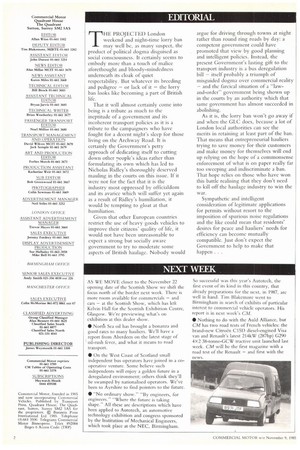EDITORIAL
Page 4

If you've noticed an error in this article please click here to report it so we can fix it.
THE PROJECTED London weekend and night-time lorry ban may well bc, as many suspect, the product of political dogma disguised as social consciousness. It certainly seems to embody more than a touch of malice aforethought and bloody-mindedness underneath its cloak of quiet respectability. But whatever its breeding and pedigree — or lack of it — the lorry ban looks like becoming a part of British life.
That it will almost certainly come into being is a tribute as much to the ineptitude of a government and its incoherent transport policies as it is a tribute to the campaigners who have fought for a decent night's sleep for those living on the Archway Road. It is certainly the Government's petty approach of dedicating itself to cutting down other people's ideas rather than formulating its own which has led to Nicholas Ridley's thoroughly deserved mauling in the courts on this issue. If it were not for the fact that it is the industry most oppressed by officialdom and its avarice which will suffer yet again as a result of Ridley's humiliation, it would be tempting to gloat at that humiliation.
Given that other European countries restrict the use of heavy goods vehicles to improve their citizens' quality of life, it would not have been unreasonable to expect a strong but socially aware government to try to moderate some aspects of British haulage. Nobody would argue for driving through towns at night rather than round ring roads by day: a competent government could have promoted that view by good planning and intelligent policies. Instead, the present Government's lasting gift to the transport industry is a bus deregulation bill — itself probably a triumph of misguided dogma over commercial reality — and the farcical situation of a "lawand-order" government being shown up in the courts by an authority which that same government has almost succeeded in abolishing.
As it is, the lorry ban won't go away if and when the GLC does, because a lot of London local authorities can see the merits in retaining at least part of the ban. That means that entrepreneurial hauliers trying to save money for their customers and make money for themselves will end up relying on the hope of a commonsense enforcement of what is on paper really far too sweeping and indiscriminate a ban. That hope relies on those who have won this battle realising that they don't need to kill off the haulage industry to win the war.
Sympathetic and intelligent consideration of legitimate applications for permits without resort to the imposition of spurious noise regulations and the like could mean that residents' desires for peace and hauliers' needs for efficiency can become mutually compatible. Just don't expect the Government to help to make that happen . .












































































































































